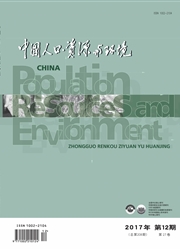

 中文摘要:
中文摘要:
土地利用活动是区域碳循环的重要影响因素,区域土地利用方式及其组合格局的改变会影响区域碳循环的规模和强度。开展区域系统碳循环的土地调控研究,有助于从区域开发、产业调整、土地规划、城镇布局及城市发展模式等方面促进区域低碳发展,是区域可持续发展的必然要求和重要途径。本文分析了土地利用对区域系统碳循环的影响机理,探讨了土地利用活动对区域自然和人为碳循环过程的影响;从土地利用方式、结构、规模和强度等方面分析了区域土地利用碳循环的土地调控机理,并提出了从价格、规划、税收和供地计划入手选择调控手段、确定调控对象,从而改变区域系统运行状况。以实现对区域碳循环进行调控的总体思路;最后从低碳土地利用技术、规划、模式和政策等四个方面提出了区域系统碳循环的土地调控的政策框架和实施策略:①低碳土地利用技术:包括低碳土地利用规划评价技术、土地节约集约利用技术和土地循环利用技术;②低碳土地利用规划:包括低碳型城镇土地利用规划、区域绿地系统规划、低碳交通用地系统规划、低碳土地利用结构布局规划及低碳主体功能区规划;⑧低碳土地利用模式:包括区域生态建设模式、环境友好型土地利用模式、紧凑型城市模式与低碳生态工业园模式;④低碳土地利用政策:包括土地碳补偿制度、土地用途管制制度、低碳土地金融制度、土地利用碳核算制度及低碳土地调控体系。通过构建区域系统碳循环的土地调控政策体系,不仅为区域土地利用活动提供指导.也可以为区域低碳土地利用调控提供参考。
 英文摘要:
英文摘要:
Land use is one of the important sources of regional carbon emissions. Changes of land use structure and pattern will inevitably influence the intensity and scale of regional carbon cycle. Research on land use regulation of regional carbon cycle is helpful to promote regional low-carbon development through territory development, industrial structure regulation, land use planning, urban arrangement and development pattems, which is an inevitable requirement and important way for regional sustainable development. Firstly, this paper analyzed the impacting mechanism of land use on regional carbon cycle, and discussed the impacts of land use activities on regional natural and anthropogenic carbon cycle processes. Then, the mechanism of land use regulation on regional carbon cycle was analyzed from aspects of land use pattern, structure, scale and intensity. The general ideas for land regulation of regional carbon cycle were put forward, which include four steps : choosing reasonable regulation measures ( such as land use price, planning, revenue and land supply plan ) , identifying regulation objects, changing the operation conditions and achieving regulation aims. Finally, the policy framework and implementation strategies for land regulation of regional carbon cycle were put forward from four aspects:(1)low-carbon land use technology, which include low-carbon land use planning assessment technology, land saving and intensive use technology and land circular use technology; (2)low-carbon land use planning, which include low-carbon urban land use planning, regional green space system planning, low-carbon transportation land use planning, low-carbon land use structure planning and low-carbon major function oriented zoning; (3)low-carbon land use patterns, which include regional ecological construction pattern, environmentally friendly land use pattern, compact city pattern and low-carbon coo-industry park mode; (4)low-carbon land use policies, which include land use carbon compensation system,
 同期刊论文项目
同期刊论文项目
 同项目期刊论文
同项目期刊论文
 期刊信息
期刊信息
